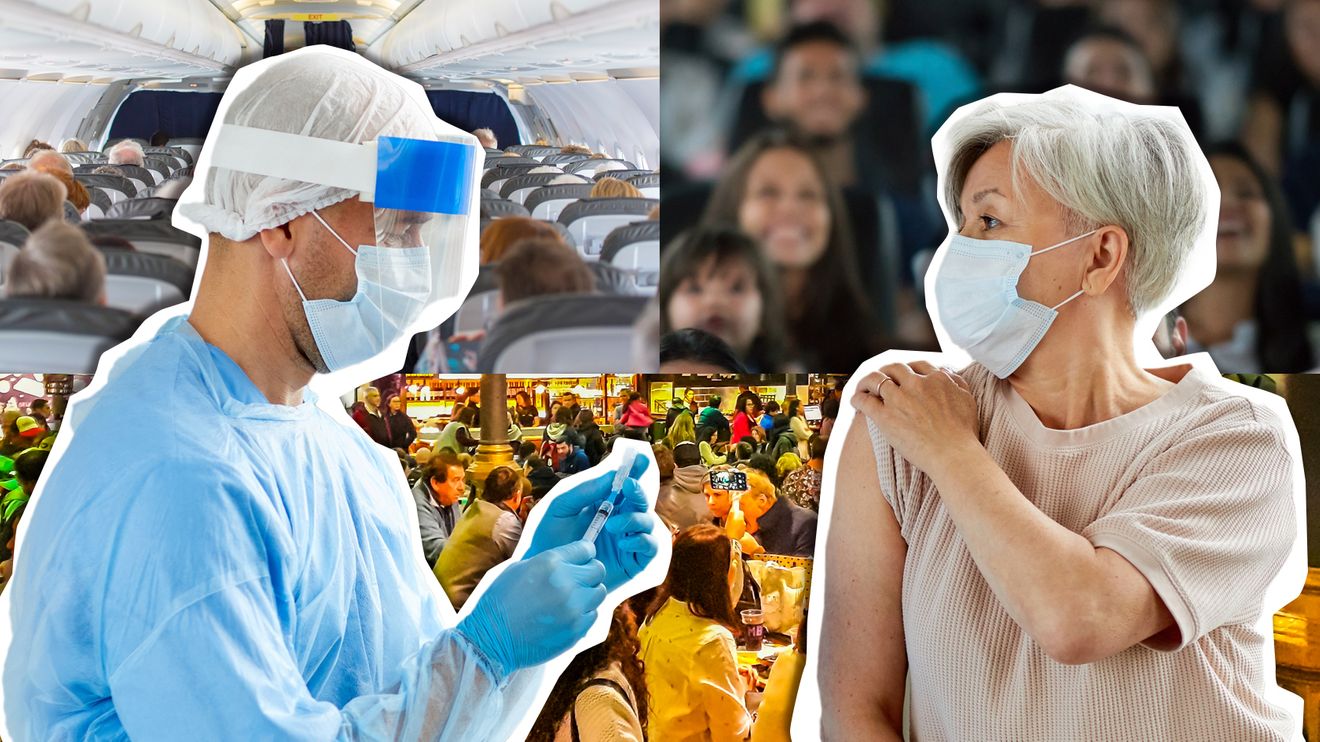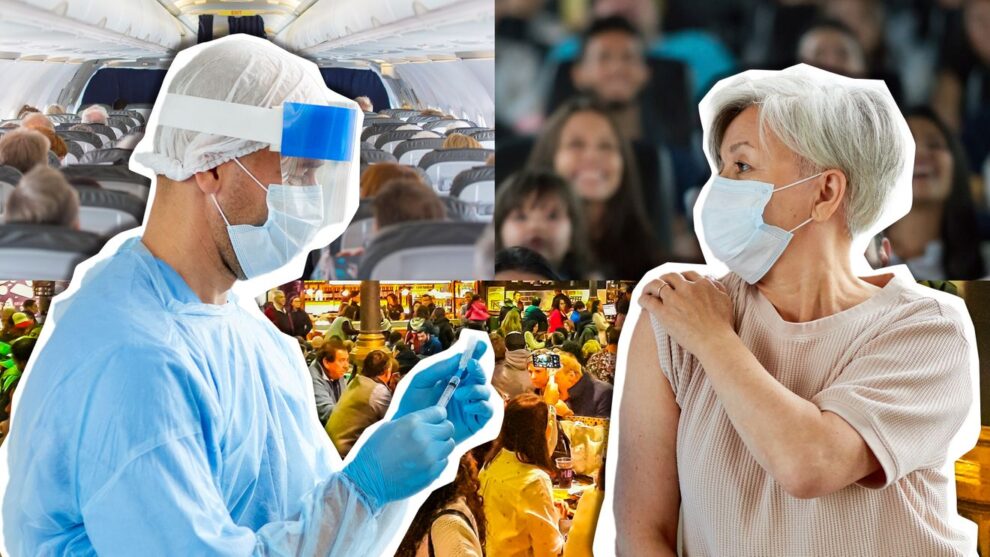
Coronavirus vaccines are the light at the end of a very dark tunnel — a pandemic that resulted in 2 million fatalities around the world and over 420,000 in the U.S. alone.
The good news and the bad news: While the light may be closer as more people get vaccinated, the end of the tunnel is still far away — even for those people who have received a vaccine.
In the U.S. more than 3 million Americans have received two doses of either vaccine, as of Monday afternoon according to data published by the U.S. Centers for Disease Control and Prevention.
They are primarily adults living or working in long-term care facilities and frontline health-care workers who received priority access to the vaccine across all states.
Both vaccines take at least two weeks from the receipt of the second dose to buildup an immune response. The Pfizer/BioNTech PFE, +2.00% BNTX, +2.00% vaccine offers 95% efficacy while the Moderna MRNA, +12.20% vaccine offers 94% efficacy, according to late-stage trials.
“ An individual who’s been vaccinated still has the ability to contract coronavirus, although they’re more likely to be asymptomatic. ”
These efficacy rates for both vaccines means there’s a “94% not getting seriously ill,” said Dr. William Schaffner, a CDC advisor and infectious disease specialist. “That’s very very successful.”
With flu shots, he said “we don’t get anywhere close to that success. Year in and year out, it’s roughly 45% [effective].”
Does that mean that those 3 million vaccinated Americans can safely return to living their pre-COVID lives two weeks after they received their second dose?
Not quite.
An individual who’s been vaccinated still has the ability to contract coronavirus, although they’re more likely to be asymptomatic, according to preliminary data. Dr. Thomas Russo, chief of infectious disease at the University at Buffalo in New York, said it’s not yet clear whether those vaccinated people would be able to pass it to others.
That’s why Russo, who received his second dose of the Pfizer vaccine on Jan 5., said he’s only comfortable interacting with people who are also at least two weeks fully vaccinated in non-masked settings.
“I would go to a dinner party with my vaccinated friends because the likelihood that we are infectious is low,” he said.
Does the efficacy-rate difference between the Pfizer and Moderna vaccines matter?
The 0.5% difference in efficacy rates is “meaningless,” said Dr. Gregory Poland, an infectious-disease expert and director of the Mayo Clinic’s Vaccine Research Group in Rochester, Minnesota.
But one potential game-changer could be the Johnson & Johnson JNJ, +1.49%, vaccine which is expected to receive emergency-authorization use approval by the Food and Drug Administration in the coming weeks.
The company is expected to release Phase 3 trial data this week, which will reveal the efficacy rate of its single-dose vaccine.
Both the Pfizer and Moderna vaccines pose low risks in terms of dangerous side effects. There were 10 cases of anaphylaxis among the roughly 4 million doses administered between Dec. 21 and Jan. 10, the CDC reported.
Do I need to continue to wear a mask, even after I have been fully vaccinated?
Even if you’ve been fully vaccinated, it’s important to continue to wear a face mask and practice social distancing in public settings like supermarkets, restaurants and transportation where you’re likely to encounter more people who haven’t been vaccinated and could potentially get infected by you.
“ Even if you’ve been fully vaccinated, it’s important to continue to wear a face mask and practice social distancing in public settings ”
Not wearing a mask around older relatives and in public places even if you’ve been fully vaccinated “creates uncertainty and stress for other individuals because they don’t know whether you’ve been vaccinated,” Russo told MarketWatch.
If I have been vaccinated, can I eat inside restaurants now?
Because diners typically don’t wear masks inside restaurants, there is a greater chance that you or another person will come into contact with respiratory droplets that can transmit coronavirus.
Outdoor dining is considerably safer than indoor dining, health experts contend, because virus-containing droplets have more room to disperse. It may also be easier to space tables more than six feet apart outdoors.
“ ‘None of us should be there,’ Russo said referring to indoor restaurants ”
Russo said he will continue to avoid indoor dining because he could potentially spread the virus to another person who isn’t vaccinated or is only partially vaccinated.
“None of us should be there,” Russo said referring to indoor restaurants.
That said, if future studies demonstrate that fully vaccinated people can’t transmit the virus Russo would reconsider indoor dining.
Is it OK to get on a plane?
Round-trip domestic flights on average were 25% cheaper last year than 2019, according to data from travel website Hopper. But prices are expected to go up later this year as more people get vaccinated, according to some travel experts.
If you’ve been fully vaccinated, you don’t necessarily need to pass up on travel steals. In fact, Russo hasn’t canceled a cruise trip he and his wife booked two years ago that’s scheduled to take place in late August this year.
He would feel comfortable going on the trip if his wife also gets fully vaccinated and everyone else on board was fully vaccinated and tested before they set sail.
Poland, however, advises against traveling because it can accelerate the spread of coronavirus. “It’s like fuel on the fire,” he told MarketWatch.
Can I visit my grandparents now that I’m vaccinated?
Coronavirus has taken a disproportionate toll on elderly people, especially those who live in long-term care facilities. Their documented vulnerability and susceptibility to contracting and potentially dying from coronavirus is why they are receiving priority access to the vaccine in the U.S., and other parts of the world.
That’s why many nursing homes during the height of the pandemic banned visitors and people stopped interacting with elderly people in person. As a result, elderly people throughout the pandemic have experienced unprecedented rates of social isolation, which has been found to increase the risk of developing dementia.
If you and an elderly friend or relative have both been fully vaccinated “the benefits of the visit will outweigh these small risks that they could have of developing a severe case of coronavirus,” Russo told MarketWatch.
Likewise, Ashley Ritter, a geriatric nurse practitioner and postdoctoral fellow at the University of Pennsylvania School of Nursing, said she’ll feel more comfortable visiting her dad who is immunocompromised and recently had a kidney transplant once she is fully vaccinated.
She is due to receive her second dose of the Pfizer vaccine on Tuesday. But Ritter, who also serves as chief clinical officer and vice president of the science-communication project Dear Pandemic, won’t visit him until he has also been fully vaccinated for two weeks.
“I haven’t seen him in so many months, so there will be so much more comfort in being in his company,” she said. She and her father still plan to wear masks around each other to make sure they’re not inadvertently asymptomatically infecting one another.
Ultimately, a return to normal hinges upon getting as many people vaccinated as possible, Ritter said. Health professionals say a vaccination rate of 70% to 80% would be close to bringing about herd immunity, where those who have the vaccine help prevent those who are not vaccinated from contracting the virus.











Add Comment